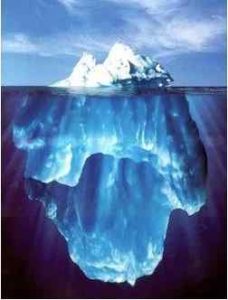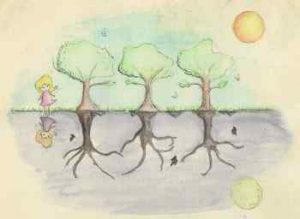Getting angry (or not) about abuse, injustice, illness
July 22nd, 2017 | Published in Social justice
I get angry about abuse and injustice, but (so far at least) not so much about my own illness. Friends are surprised by my apparent complacence. I’ve been surprised by their surprise, intrigued by my own inconsistencies, and curious about triggers for other people’s anger.

Angry reaction to abuse and injustice
Three days after Cardinal George Pell was charged with historical child abuse offences, I was sent an article by BB (a pseudonym) who is “a survivor of sexual abuse in an Australian religious orphanage in the 1950s”.
BB does not write about Pell, which is probably just as well, given the caution against contempt. This caution, importantly, is not just about Pell’s right to a fair trial but also to avoid compromising the case for victims. Interestingly, however, those speaking out in support of Pell are still being reported in the media (click here, and here), and I wonder how that’s fair.
BB names no one, being “of a cohort who cannot identify our abusers for the simple reason that we were so very young at the time of our abuse in the 1950s”.
Their anger has been pushed down and bottled up for decades:
“I have never, until now,” BB writes, “been able to express my anger at what my abusers did to me and to so many others…I could scream to the heavens about it all…Our abusers were never brought to  justice…They killed our spirits…Our anger at what they did to us, and our hatred of them, is visceral.”
justice…They killed our spirits…Our anger at what they did to us, and our hatred of them, is visceral.”
I can relate to that visceral response, and also when BB says:
“Expressing my anger verbally is very difficult. My spoken words jumble all which ways, my face grimaces uncontrollably, and the strength of my emotions shakes me.”
I know the surge of confused emotion when the attempt to speak out against abuse and injustice meets with incomprehension, denial, disdain or dismissal as ‘too emotional’.
The abuse of power involved in the abuse of children makes me want to bay at the moon. Why? Because it’s so rarely brought to full account. The church evaded public accountability for a very long time and has a history of acting more decisively against priests “who adapted the mass or advocated an end to clerical celibacy or favoured women priests” than against those who abused children.
Pope Francis may currently be challenging this conservatism, although a strong stand much earlier in his reign would have been more convincing. Delusions about celibacy have been used to excuse violation of children, and the collusion of the hierarchy has been heinous. It has, for example, been argued that only sexual penetration of women breaks the vow of celibacy.
We live in a hierarchically structured society which, by definition, means unequal distribution of power. Institutions like the church have huge influence and power compared to those abused in their care.
The power difference between clerical abusers and their victims has many implications, including differential access to the best legal representation money can buy. Cardinal Pell, for example, has hired top criminal barrister Robert Richter, QC, to represent him in court, and his legal costs are being delegated to a crowdfunding campaign.
Abuse of children occurs in a context of power which pursues them into the courtroom. If they get that far. Within the courtroom they can expect relentless interrogation and character dissection. Their attempts to survive will likely be problematised, their memories disputed, and their lifestyles vilified. In other words they will, potentially, be retraumatised. The psychic costs, quite apart from financial ones, can be huge.
My anger, I should note, is now general rather than personal. I do have my own noxious childhood history. But, on a personal level, I’ve had the opportunity to reconstruct. These days I would describe myself as privileged – white, adult, educated, and materially comfortable.
The wounds have healed, although the scars still shape who I am. My writing, once personal, is now more political.
I write about many faces of injustice – on my website, Facebook page, and Twitter – with the aim of inviting people to think about all forms of abuse and injustice within a context of power. Abuse involves abuse of power, and I don’t think we can talk about it effectively without grappling with the power relations that permeate our hierarchical society – in institutions, organisations, workplaces, and families.
(Relatively) mild reaction to my own illness
What has all this got to do with illness? Nothing directly, but it has made me think about anger. The things I get angry about, or not. The things other people get angry about, or not.
Over the last several months I’ve been diagnosed with serious lung and heart diseases. Not immediately life-threatening, but definitely debilitating. The lung disease is progressive and there’s no treatment for it. The heart disease is medically manageable, up to a point, with boxloads of medications. I am slowly coming to terms with their invasion of the breakfast table.
I’ve been surprised, since learning of my illnesses, at the number of people who ask if I’m angry.
“No,” has been my short answer. “It’s never occurred to me to be angry, or to ask ‘why me’. It’s just the way it is.”
“Remarkably pragmatic approach,” said one friend, with a look of surprise (and perhaps a hint of doubt) in her expression.
That did come as a surprise. I’m not usually called pragmatic. More frequently I’m told I’m idealistic (often with ‘too’ implied as a preface, ‘and naïve’ unspoken at the end).
I do get a bit annoyed when people say they hope I’ll soon recover, or make recommendations about the things I could be doing to feel better, or say that at least it’s not cancer.
Toni Bernhard has written a series of articles about the remarks people make to those with chronic illnesses (click here, here, and here). I can recognise many of them, and respect the strong feelings they can evoke. But, mild annoyance is as far as it goes for me.
Mild annoyance is light years away from my reaction to abuses of power.

Why the inconsistency?
How is it that I don’t react against my illness as vehemently as I do against abuse and injustice? Maybe I’m in denial, but I don’t think so. I’m not afraid of death, although I don’t want the process to be long, painful, and undignified.
Death happens to everyone. It’s not selective and hence, in that sense, not unjust.
One of the things about being ill is that you find yourself having lots of conversations about illness. I hear the anger people can feel. They’re not ready to deal with the effects. They didn’t expect it to happen yet. There’s too much they still want to do; it’s not fair, an unwelcome reminder of mortality. It is, in other words, unjust.
If I felt that injustice, I would no doubt be angry too. But, I’ve always expected (without good reason) to die relatively young. Younger than I am now. So, perhaps, in those terms, I’m enjoying some bonus years.
I remember the surge of relief I felt when I learnt that the lung disease I have (pleuroparenchymal fibroelastosis, PPFE) is not one linked to tobacco. I smoked until eight years ago, having started in my early teens. Almost fifty years of quite heavy smoking.
In the process of finding out what’s wrong with me, one radiologist referred to “opacity overlying the left hilum suggestive of malignancy”, and that really freaked me out. I imagined having to tell my family I had lung cancer. The waves of guilt (but not anger) were breathtaking. The sense of just deserts was like lead in my gut.
But the diagnosis was subsequently refined.
“You’re a lucky smoker,” the lung specialist declared. “It’s not lung cancer, and there’s no sign of emphysema.”
“Lucky” was going a bit far, but at least I didn’t have to own up to a self-inflicted death sentence.
I think the damage to the spirit that occurs with abuse (as referred to also by BB) is at the heart of it for me. My physical illness is not a function of malevolence on anybody’s part. Abuse is. It is done by some to others in a way that illness is not. And perpetrators too often get away with it, standing on their indignation and drawing on their relative power. This is injustice, and should never happen. It makes me angry.

What to do with the rest of my life?
My illness doesn’t arouse the same sense of injustice, so I can be caught unawares (although shouldn’t be) by reactions and questions that are, after all, pretty much to be expected.
In addition to questions about reactions to illness, I’ve also been asked what I want to do with the rest of my life. I get the feeling I’m expected to be able to reel off reams of exotic plans. But I don’t have any, not in the sense of a personal wish list.
 I would like a magic wand – to redistribute wealth, equalise power, address climate change, stop war, violence, abuse and hate, end discrimination, marginalisation, and disadvantage, and provide a compulsory re-education for those who cling to hierarchical privilege.
I would like a magic wand – to redistribute wealth, equalise power, address climate change, stop war, violence, abuse and hate, end discrimination, marginalisation, and disadvantage, and provide a compulsory re-education for those who cling to hierarchical privilege.
With a good enough magic wand, I would fix myself too, and others as well. But, I write this as an afterthought and without distress that it’s not going to happen.
Meanwhile, I’m curious to know what other people get angry about, and whether I seem weird by comparison. Please let me know by leaving a comment.
Scroll down for comments
First-time comments have to be moderated.
I try to complete that process, and respond, within 24 hours.
Do check back.
Social justice is for everyone (previously 2020social justice) is also on Facebook (click here)
Twitter (click here)



Came across this interesting interview with Robert Manne about his experience of having throat cancer https://www.theguardian.com/books/2017/aug/12/robert-manne-on-having-cancer-i-am-interested-in-why-i-felt-no-fear?CMP=soc_567
Thanks Joan for yet another thoughtful critique both of our deep values and responses to social justice issues and our cycle of life & death issues. I will always remember and hold dear (& regularly quote to my students and those I mentor) the words you gave me when you were my supervisor about 10 years ago. You cupped your hands and said something like: “We hold the hope for others in our care, until they are ready to hold hope for themselves” So I try to hold out hope (& support) for others, rather than fuel anger or despair. And where there is little hope in the face of death at least offer support and care. Thank you for your words of wisdom 🙂
Julie, thank you for this beautiful comment, which says so much in an implicit way about the importance of the messages we send into the universe. You reinforce the importance of doing what we can, even when we might not see immediate results.
This article is a little tangential, but it makes interesting points about the way dying has been hijacked by the medical profession, which carves us up into bits, is reluctant to admit limits, and can’t really help us decide how to spend the last months or our lives.
http://www.smh.com.au/lifestyle/health-and-wellbeing/the-last-six-months-of-my-mothers-life-20170721-gxfu9f.html
Knowing the effect the ability to employ euthanasia would have on emotions is as difficult to determine as how one would respond emotionally to the death of relative. They would be fairly unique responses I’d imagine. However, I would think most people would have an improved experience when they feel they have a measure of control. We can’t control what happens or how we feel, but we can control (in most cases except the extreme) what we do about them – because we tend to be control freaks.
In relation to our own deaths, I reckon we are entitled to be control freaks, and the sooner that can be recognised in law the better I would say. I know it’s a fraught area, and there are legitimate concerns, and many questions, but it seems the only humane direction to head.
First, sorry to hear about your illness.
I don’t think there is anything ‘weird’ about your anger towards injustice, abuse, etc but not towards your illness. Injustice etc is a controllable force, the other is not – you are (rightly so) angry at that which can be controlled but isn’t.
Life is a death sentence for us all, and being diagnosed with a terminal illness is a thing of fear. Although why that should be so, I’m not quite sure. There is no guarantee that someone who hasn’t been diagnosed is going to live any longer than someone who has. I guess the fear for those who are diagnosed with a terminal illness is the promise of enduring pain (for most terminal illnesses). Of course this brings us to the topic of euthanasia…which of course is yet another one of those controllable practices which some deny.
I think where I’m heading as a function of people’s comments, including yours, Lou, is the disinction between a reaction which may be logical (towards a “controllable force”) and those that may not be logical but are still understandably human (anger, fear, sadness about illness and impending death).
Euthanasia would make the timing of death more controllable (up to a point, depending on the extent of the safeguards seen to be necessary), which I can imagine reducing the fear of prolonged pain and indignity, but I’m not sure what effect it might have on other emotional reactions such as anger and sadness, for example, and the fear of death per se.
I agree that injustice is something we should be able to challenge with action, but rational action is more effective than emotional anger . There are fewer more ugly things than a bunch of angry men acting as a mob. I’ve marched and demonstrated and spoken and written and taught to seek change without ever being an angry irrational advocate. Frustration leads to action, it just gives you some time to be thoughtful rather than simply reactive (in my way of thinking)
The only thing you need to stop with a magic wand is greed.
Greed is at the root of all war unfairness and acts of inhumanity against our fellow humans.
That is definitely the short answer. And it would only need one wish…not a lot to ask!
I enjoy reading your articulate posts. I too feel angry at injustices, abuse of power and corruption. I feel impotent in addressing these issues but will continue to protest and support those who feel the same. Thank you again for so often writing what I feel.
Resistance against injustice, abuse of power, and corruption can often feel like a losing battle, I think, so a sense of impotence, at least some of the time, must apply pretty generally. I certainly feel it, but continue to do what seems possible because doing nothing is not an option. You also seem to do what is possible for you.
I believe (most of the time) in the water on the stone effect, and comfort myself that, without the resistance that does occur, the excesses of abuse would be worse than they are.
Your emotions are deep but logical and altruistic.
If only more people were like you this world would be so much kinder and better for all.
Thank you.
Thanks for your comments, Chantelle Prince. I will hold them close for the inevitable times of discouragement, when it can seem that the glass of kindness in the world is (barely) half-full.
A very moving and well thought out view about human emotions Joan, in particular, anger. I agree, and can only offer encouragement to keep up the great work you do, always keeping in mind “There’s a time to every purpose under the heaven”…
Great to hear from you, Ruth. The pace is slower these days, but not yet time to stop!
I would describe my feelings about injustice and abuse as being more of frustration and despair than of anger. I find anger about things beyond my control to be profoundly negative (!) and unproductive, so I try not to be an angry person.
This also perhaps feeds into why you don’t feel anger about your health- there is so much that has been dealt to you over which you have little control and anger is pointless, although you do have the power to choose your attitudes to these issues and your (our) attitudes do impact on well-being and relative health (IMHO).
Another thought-provoking post, thanks. Rob
I feel frustration and despair at times too, Robert, but find they immobilise me. Anger, on the other hand, gets me out marching and lobbying politicians and supporting campaigns and, indeed, writing webposts. Its productiveness or otherwise is, I think, largely a matter of how it’s channelled.
I agree that anger can be pointless when there’s no chance of control over the object of it, and also damaging if/when it’s displaced inaoppropriately. However, injustice (unlike illness) is something we should be able to challenge with a view to mobilising change, don’t you think?